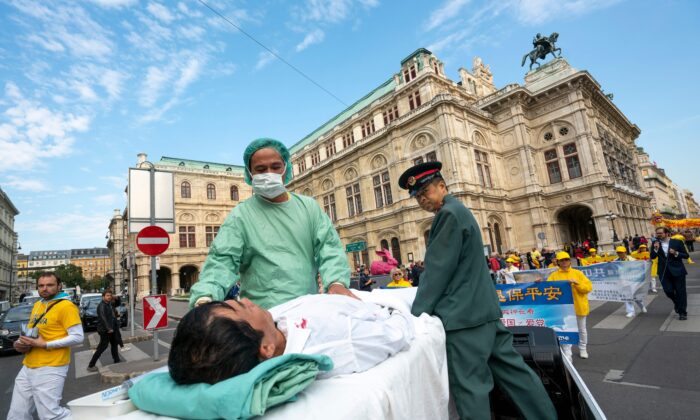California College Students Talk Pros, Cons of Distance Learning
Among abdominal transplant surgeon Dr. Alexander Toledo’s first patients at UNC Medical Center was a 41-year-old mother of three diagnosed with liver cancer.
The woman’s only hope for survival was a liver transplant. But this was not an option because she failed to meet transplant criteria—a conclusion validated at several other medical centers. Non-curative treatments might prolong her life by six to nine months.
But two months later, the woman returned to the clinic with a new liver. She had flown from North Carolina to China to get a liver transplant.
“She had received a liver transplant essentially on demand, which, of course…raised questions as to the source of the organs,” Toledo recalled of the 2008 case during an online panel hosted by the UNC (University of North Carolina) Center for Bioethics on Oct. 26.
In normal medical procedures, the primary source for a liver transplant is from a deceased donor, or in some cases from a living donor. In the case of the woman’s transplant surgery in China, there was “no meaningful donor information provided to the family beyond that the donor was young and healthy,” he said.
Spurred by this mystery, Toledo started digging. He found disturbing evidence that the Chinese regime was harvesting organs from prisoners of conscience for sale in the transplant market.
At the time, China did not have an official organ donation program, and had said that organs for transplant came from executed prisoners. But investigations into this issue found instead that prisoners of conscience were being executed for their organs. These prisoners were adherents of the persecuted spiritual practice Falun Gong.
Falun Gong, a meditation practice with moral teachings centered on the tenets of “truthfulness, compassion, and tolerance,” became popular in the 1990s, with government estimates at the time finding 70 million to 100 million practicing by the end of the decade. Deeming this a threat, the Chinese Communist Party (CCP) in 1999 launched an expansive persecution campaign. The Falun Dafa Information Center estimates that over the past two decades, millions of practitioners have been forced into labor camps, prisons, detention centers, and brainwashing centers, where they are often tortured.
In 2019, an independent people’s tribunal, after a yearlong investigation, concluded beyond reasonable doubt that the regime has for years been killing prisoners of conscience—predominantly Falun Gong practitioners—for their organs. This has been happening “on a significant scale,” and continues today, the tribunal said.
In 2015, the Chinese regime established an organ donation program and has claimed that it stopped using organs from executed prisoners since.
Despite findings emerging over the years about forced organ harvesting in China, the medical and international community “continue to struggle with their response to this,” Toledo said.
David Matas, a Canadian international human rights lawyer who has spent more than a decade researching this issue, said during the panel that the international transplant community has failed to take concrete action on the issue.
As a result, he said, the medical community is faced with “two realities:” first, the mass killing in China of prisoners of conscience for their organs, and the “second being the fact that all too many in the global transplant profession are determined to turn a blind eye to this first reality.”
Matas added that only a “tiny minority of the transplantation professionals globally are willing to do anything about transplant abuse in China.”
Some in the global transplant community have been buying “Chinese propaganda hook, line, and sinker” by uncritically repeating Party talking points seeking to discredit the evidence on mass organ harvesting, according to Matas.
“They echoed the Party line that the research is unverifiable, though it is both verifiable and verified beyond any reasonable doubt,” he said.
For instance, a 2017 conference on international organ trafficking and transplant tourism hosted by the Vatican’s Pontifical Academy of Sciences sparked controversy when it invited Dr. Huang Jiefu, then-head of the Chinese regime’s transplantation body, to attend. Huang had consistently denied China’s forced organ harvesting. In response to protests against Huang’s invitation, the academy’s chancellor said at the time that the conference was an “academic exercise and not a reprise of contentious political assertions.”
Meanwhile, researchers into transplant abuse in China were not invited to the conference.
Earlier in 2016, then-president of The Transplantation Society (TTS), Dr. Francis L. Delmonico, told a U.S. congressional hearing on organ transplant abuse in China that “I’m not here to verify. That’s not my job. … I’m only here to say that the international community has recognized this terrible practice in China and it wishes to change it.” Delmonico went on to express optimism that reforms would take place within China’s transplant system under the stewardship of Huang and his protégé, Wang Haibo.
Matas said the leadership at TTS and national transplantation bodies need to change their position on this issue and speak out against transplant abuse by the Chinese regime. At the same time, they should introduce ethical standards to ensure overseas medical professionals are not complicit in these abuses. He suggested 12 standards, including that doctors not refer transplant patients to other countries for surgery unless they can ascertain beyond reasonable doubt that the organ donor consented freely, and that studies involving recipients of organs from prisoners of conscience not be accepted for presentation or publication.
A 2019 study found that more than 400 research papers on organ transplants in China published in English-language peer-reviewed journals between 2000 and 2017 may have involved organs harvested from unconsenting prisoners of conscience. These studies failed to report whether donors had given their consent, in breach of ethical standards.
The TTS did not immediately respond to a request for comment.
Focus News: Medical Community Is Turning ‘Blind Eye’ to Forced Organ Harvesting in China: Experts
